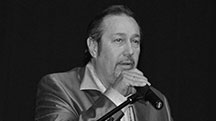
By Brett Larson, February 6, 2015
Harry Davis, Jr., was born in Los Angeles but raised — with his sister Gloria and brothers Brad, Gary, Dennis and Ron — in the projects of North Minneapolis by his mother Martha. It was a rough neighborhood, and Harry got in his share of trouble, but two things kept him grounded: boxing, and a connection to his Anishinaabe roots.
Those two themes run through Harry’s life and crop up in conversation as he reflects on where he’s been and where he’s going.
Although Minneapolis is a long way from Aazhoomog, Anishinaabe culture maintained a presence in Harry’s home — but not without effort.
“It was difficult,” he recalls. “There was very little of our culture in the urban area. If my mom needed a ceremony done she would contact her brothers up here and they would come down and do the ceremony in our home.”
Harry’s extended family was intimately involved with the culture and spirituality of the Anishinaabe. Harry would spend summers at the home of his uncle and aunt, Albert and Bernice Churchill, in Pine City, playing with his cousins, Skip and Dan and Buzz. They went to Big Drum ceremonies and other powwows and participated in singing with their drum group.
Harry remembers the stories his mother told about growing up in the Lake Lena area — how they walked miles to get to the store because they didn’t have transportation, how they lived in small homes with wood heat and no plumbing. He learned about the South School his parents and uncles and aunts attended, and about the ceremonial grounds near Lake Lena.
During his youth Harry also learned the sport of boxing.
“We had a community center, Phyllis Wheatley, and I used to go down there and play sports,” Harry said. “They had football teams, basketball teams, boxing… That’s where I learned to box. I did a little bit of competition when I was 12, but mostly I trained at home on the heavy bag and sparring with whoever would. Dad was a former Golden Glove boxer and gave me a lot of technical advice.”
Harry met and married Laureen Benjamin, who was from Lake Lena. He worked for the railroad for eight years. When that job ended around 1980, Harry and Laureen decided they had had enough city life.
They moved to Sandstone and later to Lake Lena and Hinckley. They raised five children in the District III area: Beverly, Roxanne, Dione, Weylin, and Kate.
During the ‘80s Harry became involved with restoration of the ceremonial grounds at Lake Lena. “They used to have our Midewin out there, at a big ceremonial ground,” he said. “They used to say our Midewin ceremonies were lost, and I didn’t like to hear that, so I kept talking to Buzz (Churchill) about trying to restore it. He was elected as district rep in the mid-80s, and he talked to people about getting funding to help pay some of us to clear that land and try to bring it back. So we did all the land clearing, and he obtained the funding to get the things we needed. We built a bunch of ceremonial wigwams, and Buzz’s dad, Albert Churchill, performed the ceremonies. From there it progressed and some of the other medicine men came, and they watched and learned. After my Uncle Albert passed away, my cousin Skip took it over, and he still does it.”
Priorities
Harry worked construction during the 1980s, and in the early 1990s he helped build Grand Casino Hinckley. Once the casino opened, he was hired as a slot tech and was quickly promoted to lead slot tech. After six years at the casino, he decided to run for office and was elected District III representative in 1998. He served three terms before he was defeated in 2010, but he won the seat back in 2014.
During his first terms on the job, he started a boxing program in District III, and one of his first acts upon returning to politics was to revive the program. He hopes to have boxing clubs operating in Hinckley and Lake Lena.
Harry credits his involvement in sports for keeping him out of serious trouble, and he wants to give the same opportunity to today’s youth in District III.
“Usually the kids around me, they got into trouble, and I used to stay busy with sports,” Harry said. “I did get in trouble, but not so I’d end up in the system.”
Harry has seen a lot of changes to his community during his lifetime, mostly for the better. “I feel proud for our tribe because we were really poor in our district,” he said. “We had very few jobs around here. The tribe had very little construction going on when I first moved up here. When we started getting our own resources we were able to start building our infrastructure and to hire our own Band members to do the work and train them, and they were able to live a comfortable lifestyle.”
As District III Representative, Harry’s priorities are what they’ve always been: “I want to help our Band members lead a good life, a comfortable life, and to have affordable housing and employment, and I always want to be there to help with emergencies. I want to help our Band stay successful, to stay within our culture, and to follow our culture and not lose it. The most valuable resource I believe we have is our culture.”